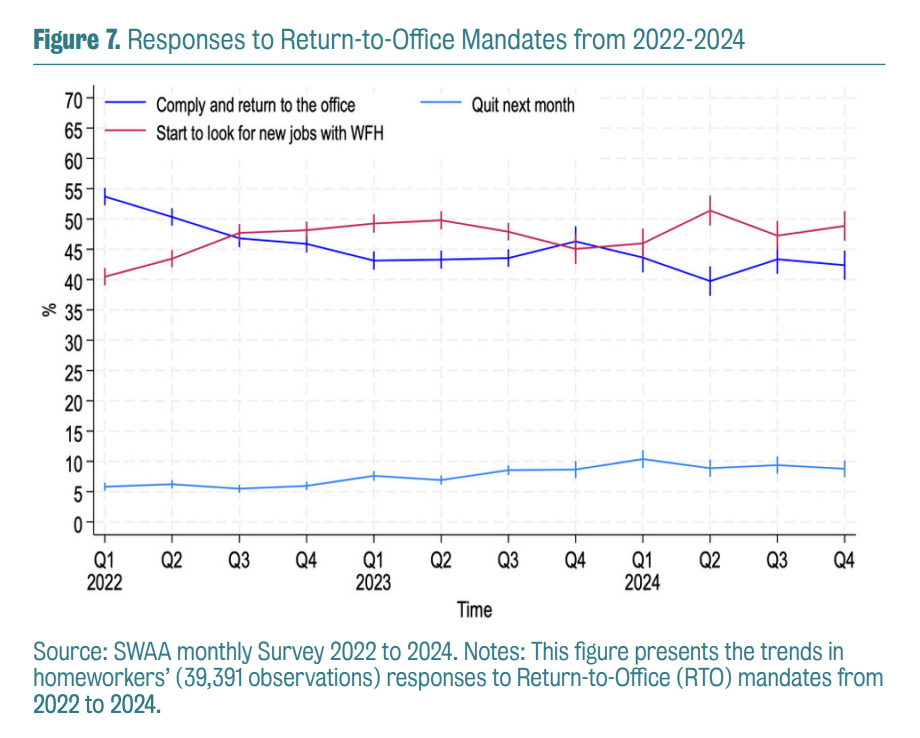
Employers told that rigid RTO mandates may create 'serious recruitment, retention challenges'

More than half of employees in the United Kingdom said they would resign if their employer implemented a five-day return-to-office (RTO) policy, according to a new study.
Researchers at the Global Institute for Women's Leadership at King's College London and King's Business School found that 58% of workers would either quit immediately (9%) or start looking for a new job if they were told to return onsite full-time.
These findings indicate that RTO mandates face growing resistance from UK employees.
In the past years, the proportion of workers saying they would look for a new job with remote work opportunities if their employer implemented RTO went up from 40% in early 2022 to 50% in the second quarter of 2024, according to the study.
In fact, the data revealed that only 42% of workers now say they would comply with a five-day RTO mandate, down from 54% in 2022.

Strong resistance to a full-time office-return came from women, where 64% said they would quit straight away or find a new job if their employer implemented an RTO policy.
This is much higher than the 51% of men who felt similarly, according to the report.
Parents have also indicated opposition to full-time office return, with 53% of fathers saying they would quit or look for a new job in response to the mandate.
Only one in three mothers with young children also said they would comply if in case an RTO policy was enforced at their workplace.
On the other hand, Black and minority ethnic workers are most likely to comply with a full-time office return, according to the report, which attributed it to job insecurity and workplace discrimination.
"RTO mandates risk creating a two-tiered labour market, especially when women and parents are more likely to remain remote, while others are less likely, all remote workers are likely to face increased flexibility stigma, bias, and career penalties," the report read.
The report comes in the wake of growing office-return mandates worldwide, where big companies such as Amazon and Dell are implementing such policies.
But this does not seem to be the case in the UK, according to the report.
"We do not see any clear signs of workers returning to the office, nor do we see evidence of employers restricting workers' homeworking possibilities in their policies," the report read. "In fact, we see a growing number of workers who can work from home, and this is especially true for parents."
However, the study noted that working from home seems to be more associated with parents, and is based on the status characteristics of employees.
"In other words, when homeworking is associated largely with parents, or even worse just mothers, it is likely to be seen only as a DEI or work-life balance policy, rather than a policy that can enhance performance outcomes for companies," the report read.
Heejung Chung, Professor of Work and Employment and Director of the Global Institute for Women's Leadership at King's College London, said managers need to understand and adapt to workers' seeing flexibility as the norm.
"Rather than forcing a return to pre-pandemic working patterns, organisations should be looking to formalise hybrid models, invest in remote collaboration tools, and set up coordinated in-office days to maximise engagement," said Chung, who is also the lead author of the study.
The study also encouraged HR leaders to make flexibility a long-term business strategy, rather than a temporary perk.
"For HR leaders and policymakers, the message is clear: well-designed hybrid working models offer significant benefits for both employers and employees that supports equality, talent retention, collaboration, and business resilience," it said.
"Rigid RTO mandates not only risk reversing these gains but may also create serious recruitment and retention challenges in a labour market where flexibility has become a baseline expectation."